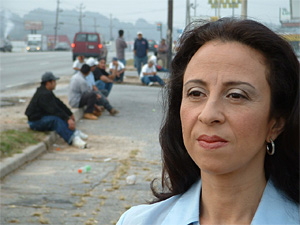
|  |  |  Travel Writers' Resources | September 2008 Travel Writers' Resources | September 2008  
It's All About Telling the Truth
 Jose de la Isla - Hispanic Link Jose de la Isla - Hispanic Link
go to original


| | Maria Hinojosa | | |
When she accepted the National Association of Hispanic Journalists 2008 leadership award at the National Press Club last week, Maria Hinojosa mentioned a conversation she had with her friend, Univision news anchor Maria Elena Salinas, who complimented Hinojosa for her advocacy journalism. Hinojosa, managing editor of the PBS newsmagazine "Now," won the award for an hour-long documentary about girls ages 12-14 that had been sold, coaxed, culturally-enticed and bound into child marriages.

The resulting complications are many - with their mates, truncated personal development, giving birth to fetuses too large for their under-developed birth canals, with dismal economic prospects. They are from places where even under the best of circumstance the odds are against them - in the bush in Niger, in rural Guatemala and other emerging countries.

Hinojosa corrected her friend. It was not advocacy journalism she was practicing. "I tell the truth," she said.

There is a difference. Having a point of view and telling your audience what it is and saying it implicitly is not partisanship.

The explanation may be nuanced; the kind of material that cynics among us would parse and parse until it is stripping of morality - objective to the point where it is devoid of heartfelt meaning, more like science.

Disembodied ideas with no feeling are often mistakenly considered superior to others, especially in our age when we learn early to in-dwell with our own egos and pretend we are the world already; that we can walk away from disturbing information just as we can from a bad play. Thank God some writers, microphones and cameras are still around to set things straight about all that.

The truth Hinojosa talks about may have advocacy as a consequence, but truth telling is self-propelled - both when it is ugly and beautiful. In her stark reality, a kind of aesthetic is possible, one that comes from the people she introduces to her audience.

That also is what Oakland Tribune photojournalist Ray Chavez accomplished with his award-winning photographs. He tells a story in pictures, called "The Mayan Way," about a family in Guatemala's San Antonio Palopo and their son in Oakland. Chavez shows with light, shadow and muted colors that run into each other like watercolors the contrasts of life. His is not so much a statement about economic imbalance but about how we allow ourselves to feel about the rich and the poor.

Sometimes the truth needs to be told in the face of danger, as when gangsters sought to terminate "with extreme prejudice" Diana Washington Valdez's reporting in The El Paso Times about the femicides in Ciudad Juarez just across the Mexican border. Through her journalistic skills, the voiceless got their story out in newsprint and in her book "The Killing Fields: Harvest of Women." She tells us how sometimes the truth runs faster than killers, as when her sources tipped her off about the danger she was in. Washington Valdez won the Del Olmo Print Journalism Award

On its path to justice, the truth also needs consistency. That is Jim Avila of ABC News, who won the Broadcast Journalist of the Year award. His body of work concerned isolated immigrant farm workers facing the most extreme of hazards during the fires in Southern California's hills and from firefights in Iraq.

Other award-winning stories included a labyrinthine to nowhere evacuation hurricane route (Brandon Garcia, KGBT-TV, Harlingen, Texas) or people who die unfairly of infectious diseases caught in a hospital (Veronica Molina, Telemundo) or something as simple as a culture change in church reflecting the arrival of new immigrants (Patricia Santos, KQTV, St. Joseph, Mo.). These and many, many other Hispanic journalists were honored at the 23rd annual NAHJ awards presentation. (www.nahj.org.)

But it was Maria Hinojosa's words that stopped me cold. I had just talked with Richard Prince, editor of the multi-ethnic blog Journalisms, and at the moment I was taken by how the honorees and their stories were "close to the ground." Detachment from people and stories has been a concern of mine. But the next connecting phrase in that conversation with Prince was "and what the stories mean in the wider context."

The missing part, the important part, was what Hinojosa voiced. Implicitly, so did the others in their acceptance remarks.

It is about telling the truth.

(Jose de la Isla writes a weekly commentary for Hispanic Link News Service. Email: joseisla3(at)yahoo.com.) |

 |
|  |



